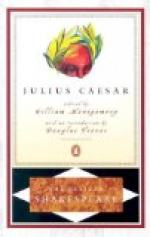|
This section contains 5,586 words (approx. 19 pages at 300 words per page) |

|
SOURCE: “The Modernity of Julius Caesar,” in Everybody's Shakespeare: Reflections Chiefly on the Tragedies, University of Nebraska Press, 1993, pp. 91-106.
In the following essay, originally published in 1981, Mack concentrates on the modern view of history presented in Julius Caesar—a conception of history as a process guided principally by nonrational forces rather than by reason, idealism, or conscious human influence.
1
In a tribute composed to introduce the collection of plays that we now call the First Folio, Shakespeare's fellow playwright Ben Jonson spoke of his colleague's works as not of an age but for all time. Though the compliment was something of a commonplace in Renaissance funerary rhetoric, it has proved to be remarkably clairvoyant, at least up to the present hour. And of no play, perhaps, has the continuing relevance been more striking than that of Julius Caesar, which again and again twentieth-century directors and producers have...
|
This section contains 5,586 words (approx. 19 pages at 300 words per page) |

|


